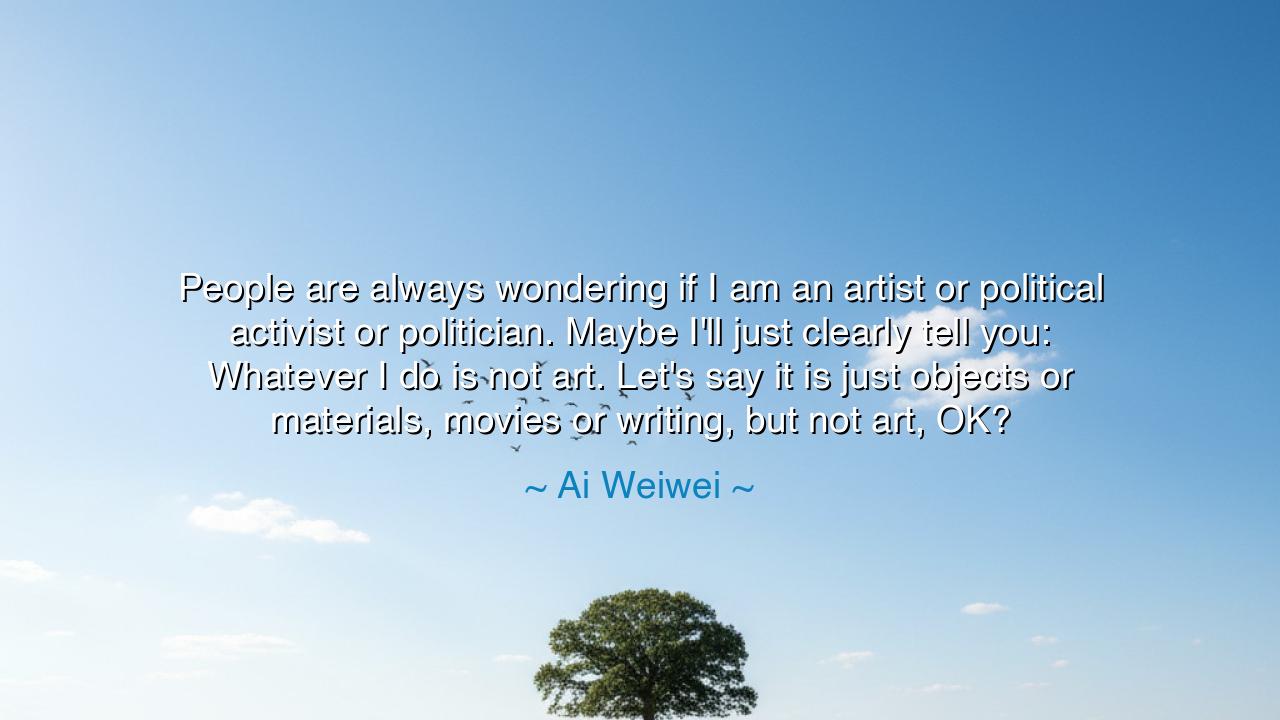
People are always wondering if I am an artist or political
People are always wondering if I am an artist or political activist or politician. Maybe I'll just clearly tell you: Whatever I do is not art. Let's say it is just objects or materials, movies or writing, but not art, OK?






Ai Weiwei’s declaration, “People are always wondering if I am an artist or political activist or politician. Maybe I'll just clearly tell you: Whatever I do is not art. Let's say it is just objects or materials, movies or writing, but not art, OK?” resonates with a depth that cuts through the very fabric of how we perceive creativity, purpose, and the nature of art itself. His words are a challenge to the assumptions that we, as a society, make about the roles people occupy and the labels we place upon them. In stating that what he does is not art, Ai Weiwei invites us to step beyond the confines of traditional labels, urging us to question what it truly means to create, to express, and to impact the world.
In this statement, Ai Weiwei addresses the constant pressure to define and categorize the work of individuals in simple terms. Art, he suggests, is not confined to galleries, museums, or the polished representations of creativity that society has come to expect. Instead, the very materials and actions that make up his work—whether objects, movies, or writing—serve a deeper purpose beyond the aesthetic. He speaks to the fact that in a world that constantly seeks to label and categorize, there is often a deeper, more complex purpose behind the creation, one that transcends the notion of “art” as a commodity or something to be admired for its beauty alone.
This distinction is rooted in Ai Weiwei’s own journey, one marked by activism, political commentary, and a constant questioning of societal norms. Just as Socrates was known for his philosophical challenges to the established beliefs of his time, Ai Weiwei’s work has always been a call to action—a demand for society to question, to resist complacency, and to confront the injustices that often remain hidden behind the surface of daily life. For Ai, the act of creation is not about adornment or celebration, but about reflection, confrontation, and disruption. His work is a mirror to the world, not merely reflecting beauty but exposing truths that many would rather ignore.
Consider the story of Michelangelo, who sculpted the iconic David, one of the most celebrated works of art in history. To some, David is a symbol of the idealized human form, a piece of art to be revered for its technical mastery. Yet, Michelangelo himself saw the statue as a medium for a greater message, not simply as an object of admiration but as a symbol of defiance against tyranny and the strength of the human spirit. In much the same way, Ai Weiwei’s works—whether the installation of 100 million porcelain sunflower seeds or his documentary on the Wenchuan earthquake—are not just art for art’s sake; they are powerful commentaries on the world’s failures and injustices. His act of creation serves as a tool for greater reflection and change.
Ai Weiwei’s insistence that what he does is “not art” forces us to rethink the very nature of creation and purpose. To call something art implies a certain finality, an expectation that it will be consumed and revered as an object of beauty or status. But Ai challenges this notion by reminding us that true creation is not about the object but about the intention behind it. It is not about creating something to be admired but something that can be used as a vehicle for dialogue, reflection, and transformation. His refusal to be boxed in as an "artist" speaks to the way that society has defined creativity—often as something that exists in a vacuum, separate from the world around it. To create, Ai suggests, is to engage with the world, to fight for what is right, to challenge what is wrong, to make the unseen visible.
In this, Ai Weiwei’s message calls upon us all to break free from the constraints of definitions. Art, in its traditional sense, is often viewed as something to be enjoyed or admired from a distance, a passive experience. But Ai’s work reminds us that creation is an active force, one that can move beyond aesthetic boundaries to become a catalyst for change. We must all ask ourselves: What does it mean to create in the world we live in? Are we creating simply to be seen, or are we creating to speak truth, to challenge, and to transform? The lesson Ai offers is clear: let your work, whatever it may be, serve a higher purpose. Do not create simply for the sake of art, but for the sake of meaning, of action, and of the world around you.
The lesson Ai Weiwei teaches us is one of profound courage. To create is to claim agency in a world that often seeks to diminish your voice. When we create, we become active participants in shaping the narrative of our world. We are not mere spectators but agents of change. As you walk through your own life, embrace your creativity—whether in your work, your relationships, or your everyday actions. Do not limit yourself to what others expect from you. Seek the deeper purpose in all that you do. Create not for admiration, but for reflection, for action, and for truth. And in doing so, you will create a world not bound by definitions, but liberated by the power of intention and purpose.






AAdministratorAdministrator
Welcome, honored guests. Please leave a comment, we will respond soon